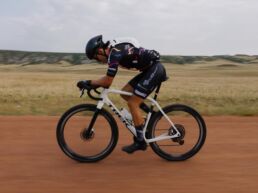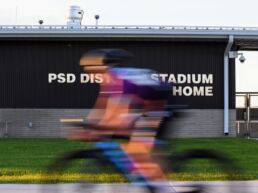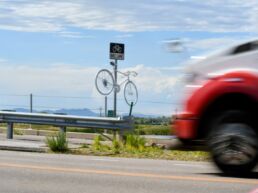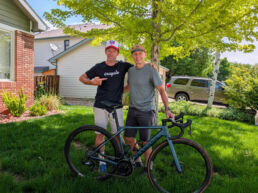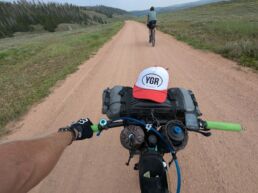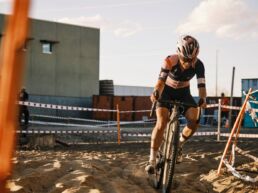
Reno Toffoli gives us a local rider’s prospective of how inexpensive, Chinese carbon fiber, wheels perform and whether or not they are good options.
The Intro:
The allure of cheap carbon parts is undeniable. The potential to have the advantages of carbon at a reasonable price is one that seems too good to be true. If cheap carbon is the siren’s song, it seems to take a lot of willpower to resist following it and wrecking your ship (or bike) on the rocks.
I once took the plunge and bought a ‘too good to be true’ set of no-name carbon bars from an undisclosed source. I was quite disappointed when they felt like an overcooked spaghetti noodle that was attached to my stem. I could easily flex them an inch or more just pedaling around the neighborhood. Fortunately I had experience with good carbon bars and knew this wasn’t how they should be so I didn’t end up risking my life by actually riding them on a trail.
My take on cheap carbon parts is that if they have an actual company with a website, a phone number, and a physical address (preferably on this continent) backing them up, they’re probably reasonably ok. I avoid the faceless cheap carbon on places like eBay like the plague; I learned my lesson with the aforementioned handlebar debacle.
I admittedly like carbon rims. Not for their ‘feel’; I can’t feel any difference between them and aluminum. I like them because they stay true better than aluminum and they don’t dent on those occasions when I bottom a tire out. I had become kind of addicted to carbon rims by buying a couple on super-clearance. Unfortunately, being on super clearance, they were a bit narrower than really suited my long travel high speed descending style.
I decided I wanted to take the plunge and buy a good carbon wheelset. I also decided that I was not going to pay $2500+ for that wheelset. After doing a bunch of online research, I came across Light Bicycle.

The Details:
Light Bicycle is a Chinese company that has become kind of the ‘name brand’ of cheap carbon wheelsets. The thing that attracted me to them was that they had good reviews from reputable sources, had products that appeared to be well engineered, and they had a North American website with warehouses in the U.S. and Canada.
LBs North American Website (us.lightbicycle.com) has a complete listing of all the rims they offer (road, mtb in 26, 27.5, 29, and fat bike) and they offer custom wheel builds with Industry 9 or Onyx hubs.
For my first set of wheels, I custom ordered the 29” version AM28 rim which is their all-mountain 28mm internal width rim. This rim features an asymmetric profile for more equalized spoke tension as well as a hookless bead and 28mm deep profile. On my build I opted for the heavier duty ‘Enduro’ version of the rim on the rear wheel for an additional $11.00. The Enduro rim adds an extra layer of carbon for increased strength and stiffness. It also adds about 50 grams of weight.
My rims were standard 32hole matte finish but you can special order different spoke counts, finishes, or weaves if you want to. The spokes included on the standard build are Sapim D-Light double butted (2/1.65/2mm) laced 2 cross with Sapim Secure Lock alloy nipples. The wheels are hand built in-house at the warehouse in Minnesota. Light Bicycle offers a 15 month warranty and 15 to 30 month crash replacement on all rims depending on which model you have.
I went with the Onyx Racing hubs on my build and have been very impressed with them. If you’re not familiar with Onyx hubs, they are worth checking out (onyxrp.com). Onyx is also based in Minnesota and first started making hubs for BMX racers. Their line now includes hubs for road, mtb, bmx, and fat bikes in pretty much every standard. The most unique thing about Onyx is their freehub sytem which uses a sprag clutch instead of the traditional ratchet setup. The advantage of the sprag clutch is that it has instant engagement, is completely silent, and is far stronger than a traditional freehub system. Another cool thing about Onyx is that their aluminum freehub bodies have replaceable U-shaped steel inserts that keep the cassette from notching the freehub. Brilliant!
The hubs are available in a dizzying array of colors and they can even custom engrave them for you. All Onyx hubs are built in the U.S. and feature hybrid ceramic bearings, easy serviceability, great customer service, and a 5-year warranty. The only real disadvantage is that the sprag clutch system is relatively heavy; 380-450g for a rear depending on freehub material. They are also expensive at around $650 for a set (the rear alone is $455).
With the Onyx hubs and an alloy freehub body upgrade, my all-mountain wheelset came in at a reasonable weight of around 1800g and an incredibly reasonable price of $1357.00. They were built to order and I had them in my hands within 10 days. One of the nice things about Light Bicycle having a North American warehouse is that you can call and talk to someone about your order and they’re more than happy to help guide you through the ordering process or make recommendations.
I was so impressed with the first set of LB wheels that I bought a second set. These were a clearance set that they had in the warehouse. They were also 29” but with a 24mm internal rim with a cosmetic weave layer, gloss finish and built up with DT Swiss 240 hubs. I believe these were a demo set but were very lightly used. I stole this set for right around $800 (regular price would have been in the $1200 range). The RM29C19 rim used in this set is billed as an all-around trail rim capable of anything from XC to all-mountain. With the lighter duty rims and lighter hubs this wheelset came in closer to 1600g.

The Ride:
I’ve had both wheelsets for around a year now and they each have 1000+ miles on them. The AM928 set with the Onyx hubs on my Niner WFO has seen only the hardest use and is still in perfect condition. I’ve built a lot of wheelsets over the years and I am thoroughly impressed with the quality of the LB build. This wheelset only sees the rowdiest trails that the Fort Collins area has to offer and in the past year has set many a Strava top 10 (or KOM) on the descents. I have not had to touch the wheelset with a spoke wrench since I put it on the bike. Both wheels are still perfectly true and tensioned which I find astounding. I am a pretty smooth rider but I’m heavy and I descend fast and these wheels haven’t flinched.
Because of my weight (around 200lbs suited up) and style, I run fairly high tire pressures to protect against rim strikes. I run my Maxxis Ardent 2.4s at 33psi in the rear and 25psi or so in the front. Even with these pressures, I’ve still had rim strikes here and there with no issues. The rims have some cosmetic scratches in them but are still structurally sound. The Onyx hubs have been flawless and I’m now addicted to the silent operation and instant engagement of the sprag system. They are also still spinning perfectly smoothly and have not needed any kind of service or bearing adjustment at all.
The RM29C19 wheelset went on my previous generation Niner RIP9 RDO. I don’t ride this bike nearly as hard as the WFO but the 24mm ‘jack of all trades’ wheelset has suited this bike really well. Again, I haven’t had to true or tension the wheels at all and they just keep on trucking. Because I was so spoiled by the Onyx hubs instant engagement, I did have to update the DT rear hub to the 54t ratchet. Next to Onyx, The DT star ratchet system is a close second. I have put thousands of miles on DT hubs and never had a failure.
I have the same Maxxis Ardent tires on the 24mm rims and they have a nice profile and round out to their claimed 2.4” width. Admittedly, they do have a nicer profile on the 28mm rims and fill out to nearly 2.5”. I run lower pressures on the 24mm rims, typically around 28 psi in the rear and 23psi in the front. I haven’t had any issues with burping or rim strikes and both sets mounted up tubeless very easily.
As far as ride quality goes, I’m not the one to ask. As I mentioned previously, I can’t tell the difference between carbon wheels (or frames) and aluminum ones. Between the tires and suspension, I couldn’t tell you if the rims are stiff or compliant in one direction or another. So I guess they feel the same as any other wheelset I’ve ridden and I suppose that’s a good thing.
Asa comparison, the last set of aluminum wheels that I had on the WFO were Stan’s Flow Mk3s. While these are a nice set of wheels at less than half the price of the LB set, they didn’t hold up even close to as well. In the 8 months or so I had them on the bike I had a broken freehub that was warrantied, had to tension them several times, true them quite a bit, and the rear ended up with so many dents that I was worried about it not being able to hold air or just plain cracking. The Light Bicycle wheelset on the same bike with the same rider on the same trails is still perfect save for a few rock scratches here and there.
If you’re looking for a ‘cheap’ set of carbon wheels, I would highly recommend Light Bicycle. There are some other companies starting to make carbon wheels in the same price range but I haven’t seen any that are hand built and customizable with high end hubs such as Industry 9 or Onyx. As an extra bonus, if you already have hubs and/or like to build your own wheels, you can buy bare rims from LB as well. The great warranty, crash replacement, and personalized customer service should give you the peace of mind you need to go ahead and take the plunge.
Enjoy!
